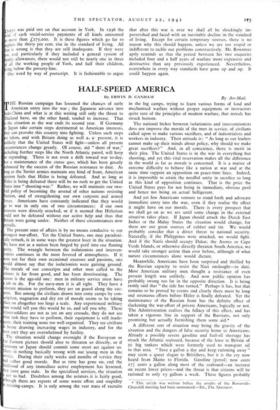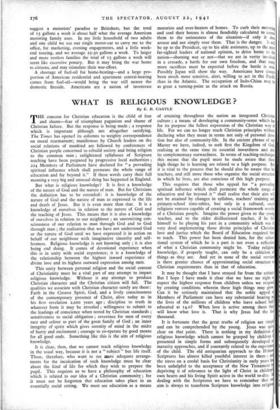HALF-SPEED AMERICA
By ERWIN HE Russian campaign has lessened the chances of early American entry into the war ; the Japanese advance into do-China and what is at this writing still only the threat to hailand have, on the other hand, tended to increase. That the situation as the war encfs its second year. If Germany r Japan take certain steps detrimental to American interests, y can provoke this country into fighting. Unless such steps re taken, and with Britain doing as well as a, present, it is nlikely that the United States will fight—unless all present ircumstances change greatly. Of course, aid " short of war," chiding further steps like the North Atlantic patrol, will keep n expanding. There is not even a drift toward war to-day, ut a maintenance of the status quo, which has been greatly nhanced by the success of the Russian resistance to date. As ng as the Soviet armies maintain any kind of front, American pinion feels that Hitler is being defeated. And as long as 'tier is being defeated there will be no rush to get the United tates into " shooting-war." Rather, we will maintain our two- ld policy of becoming the arsenal of other nations resisting 'azism, and of strengthening our own outposts and armed orces. Americans have constantly indicated that they would o to war in only one of two circumstances: if our own terests were directly attacked, or if it seemed that Hitlerism ould not be defeated without our active help and thus that itain were going under. Neither of these circumstances now revails.
The present state of affairs is by no means conducive to our trongest war-effort. Yet the United States, one may paradoxi- ally remark, is in some ways the greatest loser in the situation. 'e have not as a nation been forged by peril into one flaming thy. The wrangle between the isolationists and interven- mists continues in the most fevered of atmospheres. If it ere not for their own occasional excesses and passions, one 'add almost say that the isolationists were gaining ground. he morale of our conscripts and other men called to the olours is far from good, and has been deteriorating. The ason is the age-old one: men in military service must have job to do. For the navy-men it is all right. They have a onstant mission to perform, they are on guard along the out- osts. But among the civilians drawn into army camps by con- ption, stagnation and dry rot of morale seems to be taking lace on altogether too large a scale. Any experienced military n would tell you this would be so, and tell you why. These tizen-soldiers are not as yet on any crusade, they do not see hat task they have to perform, their equipment is still inade- uate, their training none too well organised. They see civilians home drawing increasing wages in industry, and for the lost part they are overwhelmed by futility.
The situation would change overnight if the European or ar Eastern picture should alter to threaten us directly, or if ermany or Japan should commit some overt act against us. here is nothing basically wrong with our young men in the rvice. During their early weeks and months of service they ad rather good morale. But as time has gone on, and the kelihood of any immediate active employment has lessened, ey have gone stale. In the specialised services, the situation not so bad. Doubtless among the aviators it is fairly good, though there are reports of some waste effort and stupidity training-camps. It is only among the vast mass of recruits in the big camps, trying to learn various forms of land and mechanised warfare without limper equipment or instructors quite sure of the principles of modern warfare, that morale has struck bottom.
The national bicker between isolationists and interventionists does not improve the morale of the men in service, of civilians called upon to make various sacrifices, and of industrialists and workers in industry. Their attitude is: " As long as our leaders cannot make up their minds about policy, why should we make great sacrifices?" And, in all conscience, there is merit in their plea. The United States is in the war in everything but shooting, and yet this vital reservation makes all the difference in the world as far as morale is concerned. It is a matter of extreme difficulty to behave like a nation at war and at the same time support an opposition on peace-time lines. Indeed, it is impossible to attain the needful unity in sacrifice so long as this kind of opposition continues. That is the price the United States pays for not being in immediate, obvious peril and hence not being an actual belligerent.
And yet few Americans venture to stand forth and advocate immediate entry into the war, even if they realise the effect it might have on our morale. There is every prospect that we shall go on as we are until some change in the external situation takes place. If Japan should attack the Dutch East Indies or the Malay States the situation would change, for these are our great sources of rubber and tin. We would probably consider that a direct threat to national security. Naturally, if the Philippines were attacked, we would fight. And if the Nazis should occupy Dakar, the Azores or Cape Verde Islands, or otherwise directly threaten South America, we would take stronger action than ever before, although of what nature circumstances alone would dictate.
Meanwhile, Americans have been surprised and thrilled by the Russian capacity to resist the Nazi onslaught—to date. Most American military men thought a resistance of even present length was unlikely. And now public opinion has probably swung too far in the opposite direction. It is being rashly said that " the tide has turned." Perhaps it has, but that remains to be proved by events and clearly there must be long and strenuous efforts before Hitler is finally defeated. Yet the maintenance of the Russian front has the definite effect of slackening the war-effort of private Americans, logically or not. The Administration realises the fallacy of this effect, and has taken a vigorous line in support of the Russians, not only promising but actually furnishing them some aid.* A different sort of situation may bring the gravity .of the situation and the dangers of false security home to Americans. Already a possibly severe gasoline and fuel-oil shortage has struck the Atlantic seaboard, because of the lease to Britain of 50 big tankers which were formerly used to transport oil to that area. " Save a gallon a day and keep rationing away " may seem a queer slogan to Britishers, but it is the cry now heard from Maine to Florida. Gasoline (petrol) now costs 171 cents a gallon along most of the seaboard—an increase on recent lower prices—and the threat is that citizens will be rationed to only 15 gallons a week. These figures probably * This article was written before the results of the Roosevelt- Churchill meeting had been announced.—En., The Spectator.
suggest a motorists' paradise to Britishers, but the total of 15 gallons a week is about half what the average American motoring family uses. In my little household of two adults and one child we use our single motor-car to carry me to the office, for marketing, evening engagements, and a little week- end touring, and we average 25-3o gallons a week. To larger and more restless families the total of 15 gallons a week will seem like excessive penury. But it may bring the war home to citizens, and may stimulate their war-effort.
A shortage of fuel-oil for home-heating—and a large pro- portion of American residential and apartment central-heating comes from fuel-oil—would bring the war still nearer the domestic fireside. Americans are a nation of inveterate motorists and over-heaters of homes. To curb their motoring and cool their houses is almost fiendishly calculated to arouse them to the seriousness of the situation—if only it does arouse and not simply sour them. That is the danger. It will be up to the President, up to his able assistants, up to the most far-sighted leaders of national opinion, to drive home to the nation—shooting war or not—that we are in verity involved in a crusade, a battle for our own freedom, and that many more sacrifices must be expected before the battle is won. Possibly Japan will show the way. Americans have always been much more sensitive, alert, willing to act in the Pacific than in the Atlantic. The occupation of Indo-China may b; as great a turning-point as the attack on Russia.



























 Previous page
Previous page